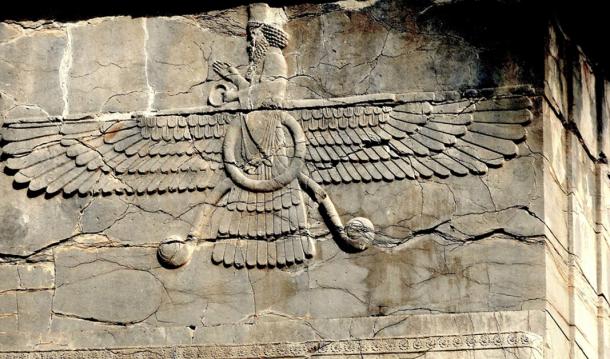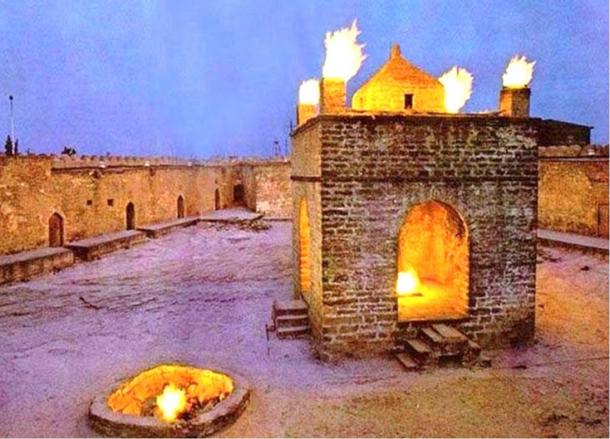Zarathushtra - The Revolutionary Iranian Prophet and First Philosopher in History
17 May, 2015 - 02:44, Source

There was a time when the philosophy of oneness, one entity and one universal power emerged out of the polytheistic teachings. The Persian words goftare nik, pendare nik, kerdare nik meaning good words, good thoughts, good deeds became the main keystones of the religion called Zoroastrianism. It is known as history's oldest monotheistic religion and was founded by a man who became a prophet and who also was the first philosopher in history. His name was Zarathushtra. These ideas were sprung out of the place where Zarathushtra lived which is considered to be in modern day northeastern Iran and which in ancient times were one of the main geographical sites where the Aryan civilization thrived.
Birth and Early life
It all began with a man named Pourushaspa met a young woman named Dughdova. The two married and she became a part of the family of Pourushaspa named Spitama. The two of them had two children together until a few years later, when relatives and friends received the news that Dughdova was pregnant to a third child. The legend says that while she was pregnant, she started to have apocalyptic nightmares. When she was in the fifth month of pregnancy, she dreamt that the world was destroyed and as she became deeply frightened, an angel suddenly revealed itself in the dream and told her that she was carrying a very special boy who would change the world and prevent evil from becoming victorious. Time passed by and the day of giving birth arrived. When the boy was born, family and relatives immediately noticed that this infant differed from other infants. The boy did not cry, but instead giggled and had a smile on his face.
Pourushaspa and Dughdova named their newborn son Zarathushtra, meaning golden light.
While there formerly has been disagreements among historians regarding the birth date of Zarathushtra, the latest archeological and historical evidence all point to the fact that he was born between 1800 - 1700 BC. This information converges with the traditional date which states that the Zoroastrian calendar starts with the birth of Zarathushtra on 26 March 1738 BC. This date is still celebrated among modern Zoroastrians and coincides with the Persian new year celebration called Nowruz which takes place on 21 March.
As a child, Zarathushtra developed a profound curiosity for everything in nature and he often questioned life. He was an intelligent child who was very observant and wanted to have clear cut answers to every question that came to his mind. With his ability to see through the surface of things and penetrate to the depth of their cause and meaning, he often confronted local priests and teachers about the meaning of their polytheistic teachings. However, either the priests and teachers barely managed to answer his questions or Zarathushtra himself was not satisfied with the answers he received. At the age of nine, his friends arranged a meeting for him with the head priest of his town to discuss the questions he wanted to have answered. Zarathushtra and the head priest discussed for several hours but ultimately, neither side could convince the other.
Many of the questions that Zarathushtra asked had however deeply affected the priest. The fact that the priest could not answer the child's questions shocked him and made him feel miserable. The legend says that while the priest was on his way home after the meeting, troubled by the situation, he suffered a heart attack and died right on the spot.
When Zarathushtra turned 20 years old, he decided to leave his birthplace and travel to distant places in search of the Truth. He spent years philosophizing in the wilderness of the various places he visited. During his travels he also met and married a woman named Hvovi, with whom he had six children.
The Illumination
After ten years of traveling, Zarathushtra was now at the age of 30. One early morning, he went to the river to bring water back to his residence. As he stepped into the water, a divine entity named Vohu Mana meaning The Good Mind suddenly appeared to him. Vohu Mana then opened a portal to the bright divine light of God named Ahura Mazda, meaning The Wise Spirit.
In his vision, he experienced the presence of Ahura Mazda and perceived him as the creator of universe. He also experienced the presence of the so called Amesha Spentas which are six divine entities that act as the protectors of the physical world and obey the decisions of Ahura Mazda. To Zarathushtra, the Amesha Spentas were perceived as abstract entities but in ancient scriptures they have been described as angels, so that one can easily grasp their abstract nature. He understood the roles of the Amesha Spentas in the world order and creation. The creation of universe was explained to him and also the importance of Truth and order. He understood that Truth and order were essential for maintaining the universe as a good place away from the evil spirit named Ahriman who always tries to implant lies in the minds of humans in order to create falsehood, misery and chaos.
Zarathushtra had received illumination. The Truth which he had long searched for had suddenly appeared to him. In that split moment, all his questions were answered.
With a sense of relief and ultimate joy, Zarathushtra decided that the divine message had to be shared with the world. He went back to his home town and met his family. He gathered all the members of his family around him and told them about his illumination and ultimately asked them if they would be pleased to join in his footsteps and live by his philosophy and the divine message he had received. The first person to join was his brother Maedyoimaha, followed by his wife Hvovi and his six children.





